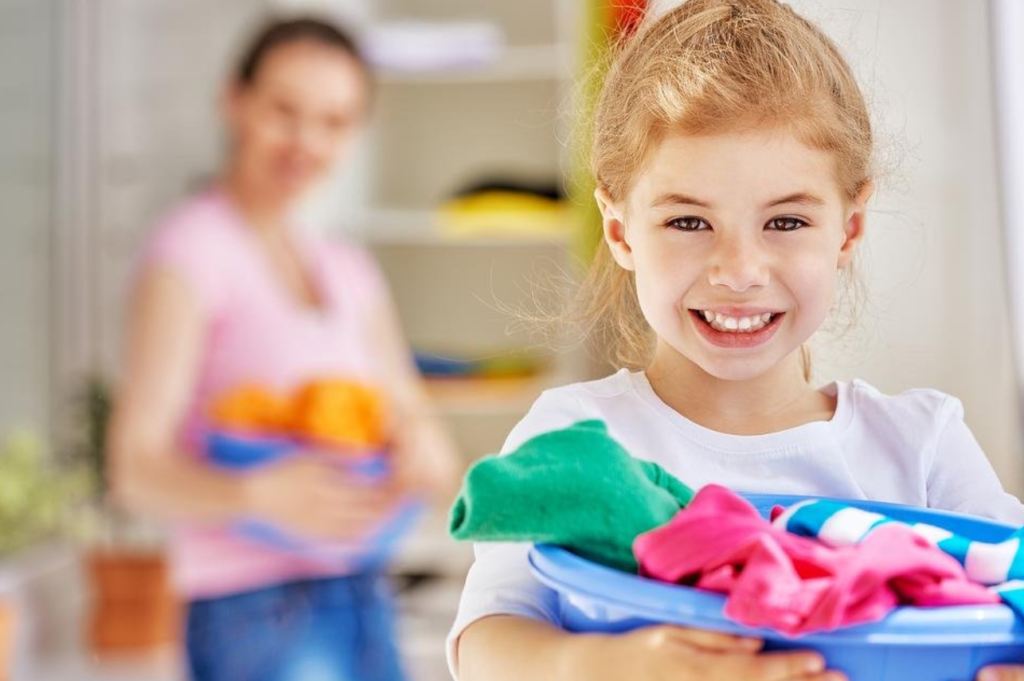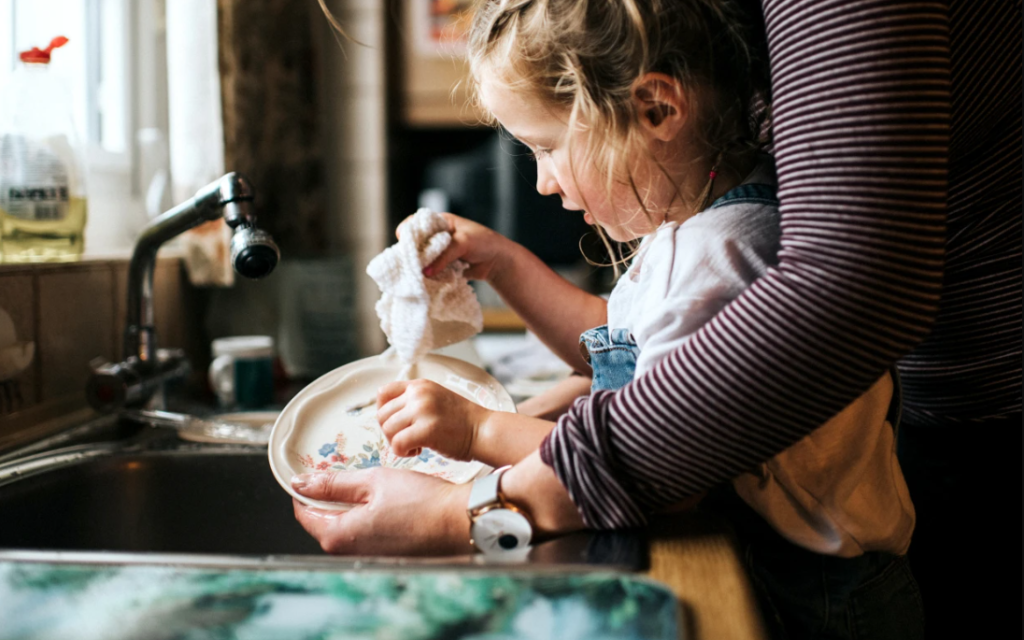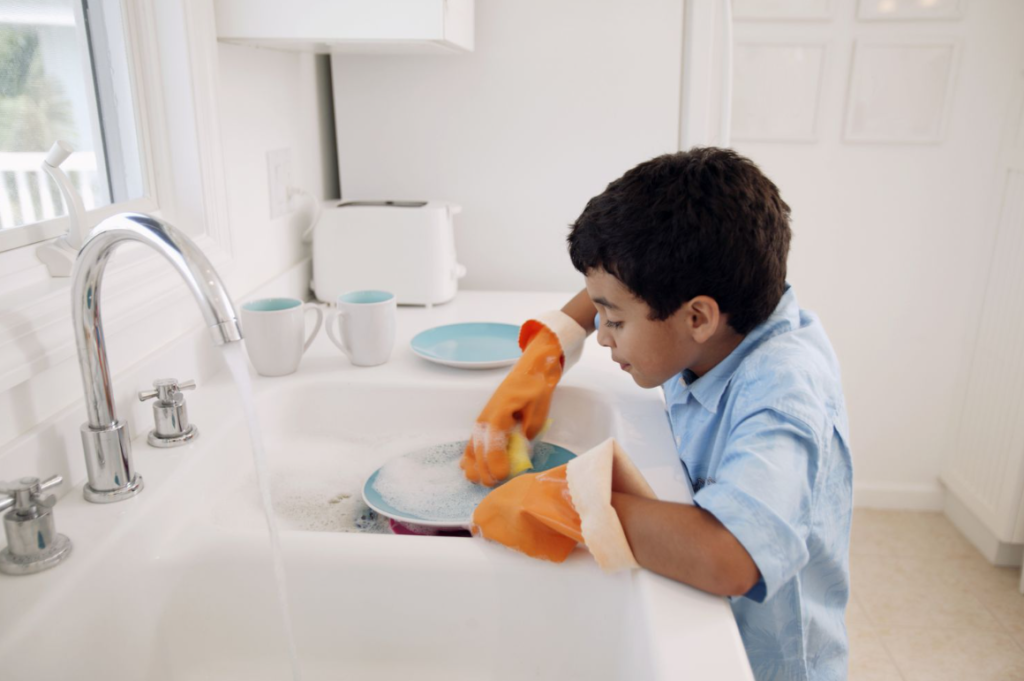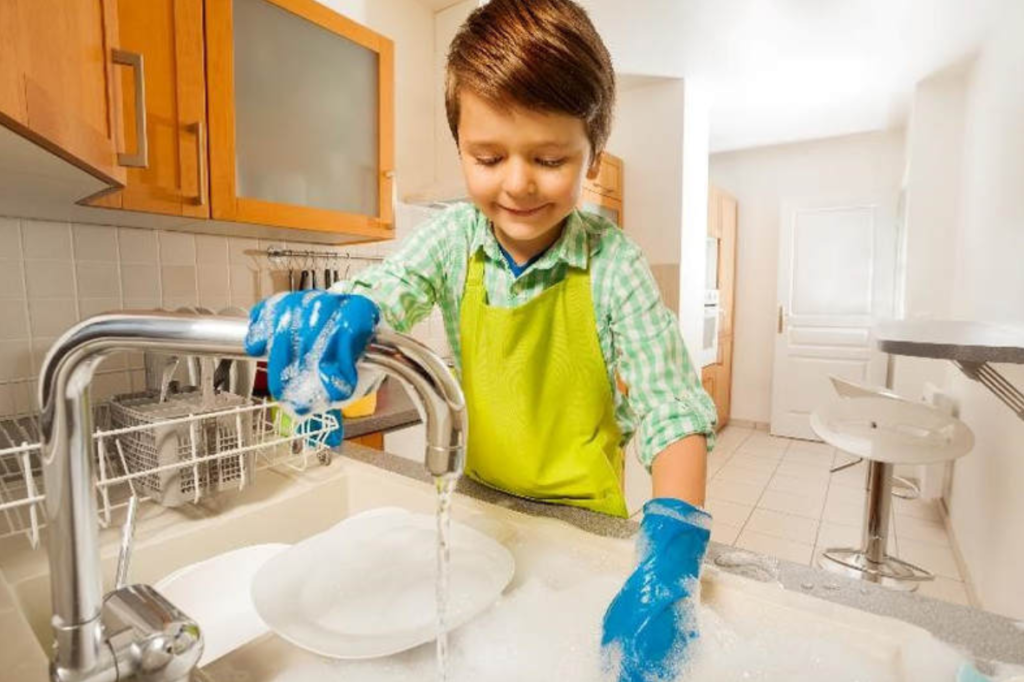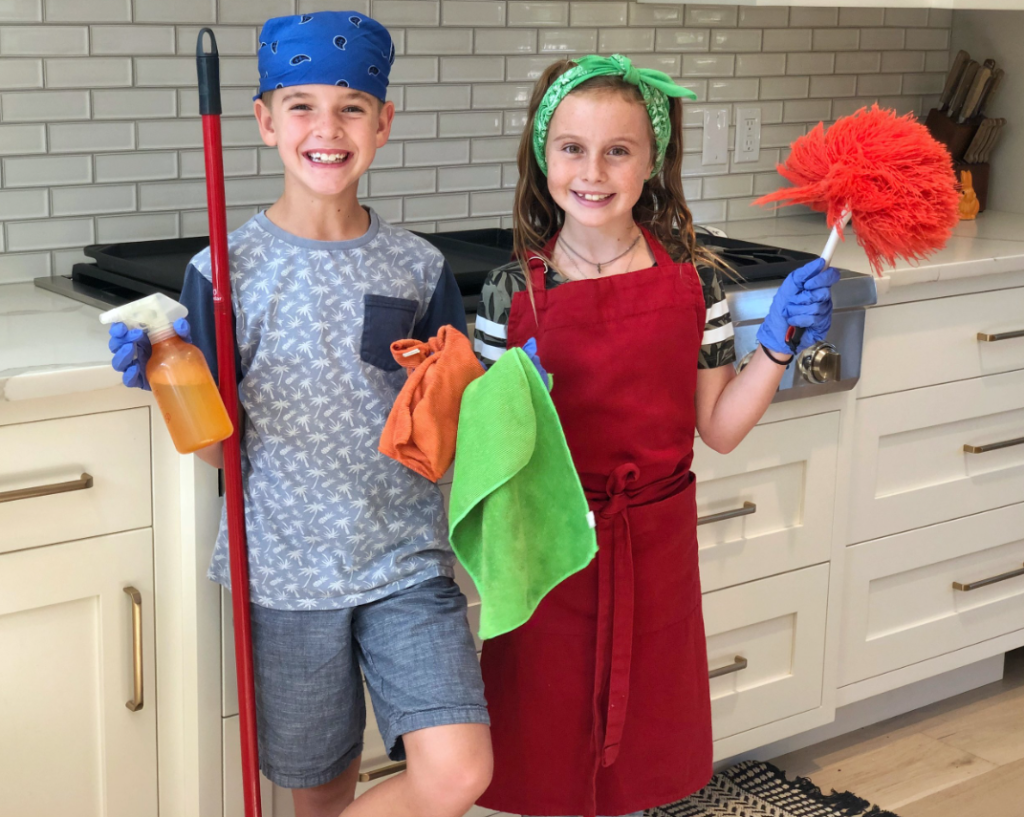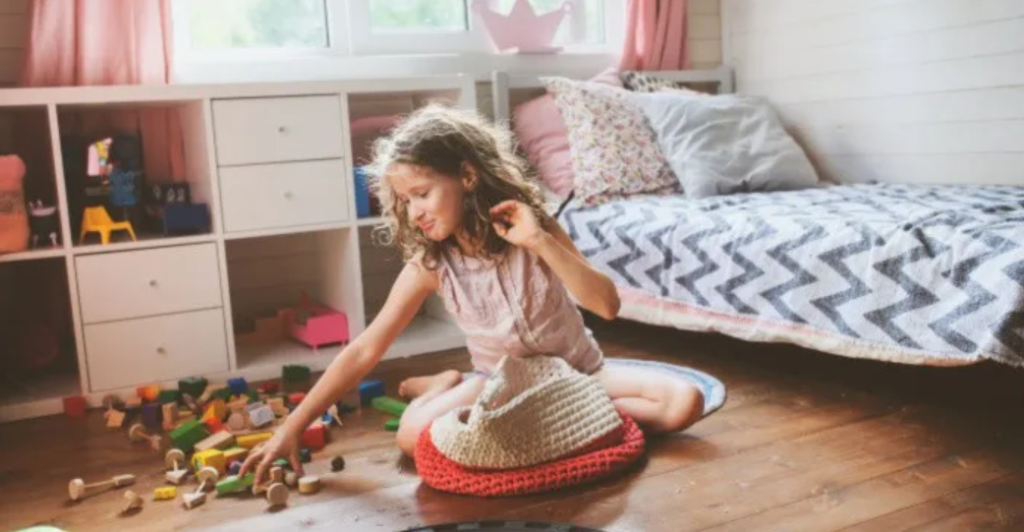Research shows that children who begin engaging in chores at an early age tend to experience greater success in their relationships, academics, and careers. Discover effective strategies to encourage children to participate in household tasks without any resistance willingly.
Children have an innate knack for creating messes, but their enthusiasm tends to wane when it comes to cleaning up. Unfortunately, this often means that the responsibility of tidying falls on mom or dad. In fact, according to a survey conducted by ClosetMaid, parents find themselves picking up after their kids an average of 28 times a week.
Surprisingly, half of the parents end up doing their children’s chores themselves to ensure they are completed to their satisfaction.
Similar to teaching young children about the value of money, it is equally important to instill the significance of cleaning in them. By doing so, you empower them to not only willingly engage in cleaning tasks on a regular basis (which is definitely beneficial) but also develop a lifelong understanding of its importance. Here are 12 effective methods to teach children the significance of cleaning and ensure it becomes a valuable habit that lasts a lifetime.
Toddlers may not be able to clean, but they can still help
According to the aforementioned study, it is suggested that starting cleaning habits as early as three years old can benefit children later in life. While it may seem young and their attention span and cognitive abilities may be limited, young children can still contribute and be involved in the cleaning process. Sonja Meehan, a professional organizer and a mother of two boys, highlights that toddlers are usually eager to participate in any activity, including tidying up.
Taking advantage of their enthusiasm, parents can help them develop good habits from an early age. Tasks such as sorting socks, dusting low surfaces, pushing buttons on the washing machine, and picking up toys are suitable ways for young children to participate in chores and foster a sense of responsibility.
Banish the concept of cleaning as punishment
As a child, I can recall numerous instances when I was assigned yard work or tasked with scrubbing the kitchen floor as a form of punishment. While my mother’s intention may have been good, and it certainly achieved the desired outcome at the time, this approach doesn’t necessarily instill a positive attitude towards cleaning in children. Instead, it is more effective to convey the message that cleaning is not a punishment or a tedious chore but rather a means to make other things possible.
As Dr. Tamar Chansky suggests, approaching cleaning with a negative and grumpy demeanor will likely evoke a similar response from children. It is important to foster a positive mindset and communicate the benefits and possibilities that arise from maintaining a clean and organized environment.
Communicate why cleaning is important on a strictly hygienic level
Britta Gidican, a corporate communications professional in Seattle, discovered that helping her child understand the consequences of a messy home sparked his interest in cleaning. By explaining how germs can spread and how bugs create webs or nests in untidy spaces, Gidican effectively conveyed the reasons behind the need to clean. She began having these conversations when her son was around three years old.
This approach has proven successful in illustrating the importance of cleanliness, as her son now comprehends the concept and even takes it upon himself to explain it to others. If he observes someone leaving dirty clothes on the floor or neglecting to clean up their dishes, he confidently lectures them about the significance of maintaining tidiness.
Give them options
One way to make chores feel less like a punishment is to involve young kids in the decision-making process. Give them some choice and control over the tasks they will be responsible for. As Dr.
Tamar Chansky suggests, you can allow your child to choose their preferred chore within the boundaries you set. For example, you can give them options like organizing blocks or sorting clothes and let them decide which one they prefer. Additionally, children can choose specific tasks they enjoy, such as shredding mail, watering plants, or setting the table. They will feel more motivated and engaged in the cleaning process by granting them a sense of ownership over their designated area or tasks.
Make it a family affair
According to Dr. Tamar Chansky, encourage a collaborative approach instead of letting your child clean up alone. Set aside dedicated “clean sweep” times where a family member sets a 10-minute timer, and everyone works together to clean and tidy the space.
This not only fosters a sense of togetherness but also allows everyone to enjoy the rewards of a cleaner environment.
To further instill a sense of community and purpose, emphasize to your little ones that their help with cleaning creates more quality time for you as parents to play and engage with them. By highlighting the benefits of their contribution, you can motivate them to participate willingly and feel proud of their role in maintaining a clean home.
Use a timer to “race” your kids in clean-ups
Gidican has discovered that incorporating a timer into her son’s cleaning routine taps into his competitive nature. “We started setting timers on tasks like tidying up to make it more fun and engaging for him,” Gidican explains. “Since he’s a highly competitive kid, it worked out perfectly.
This approach has helped us avoid tantrums and meltdowns about cleaning.” Sherri Curley, a home organizer and speaker, suggests using the Time Timer app for a clear visual representation of time ticking away. Additionally, she recommends the app Habitica, which adds a playful and gamified element to tackling tasks. These tools can make cleaning more enjoyable and provide a sense of accomplishment for young kids.
Have your child factor clean-up time into play dates
Planning a playdate for your child? It’s a great opportunity to teach them about cleaning up after themselves and the value of teamwork. Before the playdate begins, set the expectation that cleanliness is important. Make sure the play area is tidy and ready for guests.
About 20 minutes before the playdate ends, let the kids know that it’s time to start cleaning up. They can either do it together, or your child can tackle it alone afterward. Cleaning up with a friend can make the task more enjoyable and efficient. By instilling this routine, your child will learn responsibility and the importance of tidying up after playtime.
Implement ‘Grandma’s Rule’
You may be familiar with the classic discipline strategy called “Grandma’s Rule,” also known as the Premack Principle. Here’s a reminder: “No dessert until you finish your dinner,” as Grandma would say. This rule can be useful when teaching children to develop a habit of cleaning.
Chansky suggests using “clean sweeps” timed before activities that kids are excited about, such as going to the movies. For example, you can say, “We’re going to the movies at 3 pm. Let’s plan our clean sweeps to do before that.” By linking enjoyable activities to completing cleaning tasks, children learn the importance of responsibility and earn their rewards.
Make allowance dependent on housework — along with bonuses and fees
In the adult world, money doesn’t come for free, and there’s a compelling argument that the same should apply in a child’s world. Once a child understands the importance of cleaning and why it matters, parents may consider tying their allowance to the completion of chores. However, it doesn’t have to be as straightforward as “if you do your chores, you get your weekly $10” or any set amount.
Leta Seletzky, a writer and mother in Walnut Creek, California, takes a unique approach with her two eldest sons (ages nine and 12) by treating their housework like real work, complete with taxes, fees, and bonuses. This method helps instill a sense of responsibility and financial awareness in her children.
Inspire your kids to declutter by letting them pick a charity
The earlier mentioned ClosetMaid study revealed that children, on average, have about 59 toys and approximately 75 percent of parents admit to secretly getting rid of toys in an attempt to downsize. While the intention behind this may be well-meaning, it can feel like gaslighting to the kids. A more effective approach to decluttering your children’s room is to involve them in the process and ignite their passion for it by letting them choose a charity to donate to.
Ali Wenzke, author of “The Art of Happy Moving: How to Declutter, Pack, and Start Over While Maintaining Your Sanity and Finding Happiness,” suggests involving her kids in the decision-making process by selecting a charity where their donations will go. This personal connection becomes meaningful when they understand who will benefit from their items. For example, donating Elmo or Transformer banners to a local charity that collects party supplies for kids in foster care who have never had a birthday party before can create an unforgettable experience for another child.
This perspective makes it easier to say goodbye to the toys, knowing they will bring joy to someone else.


